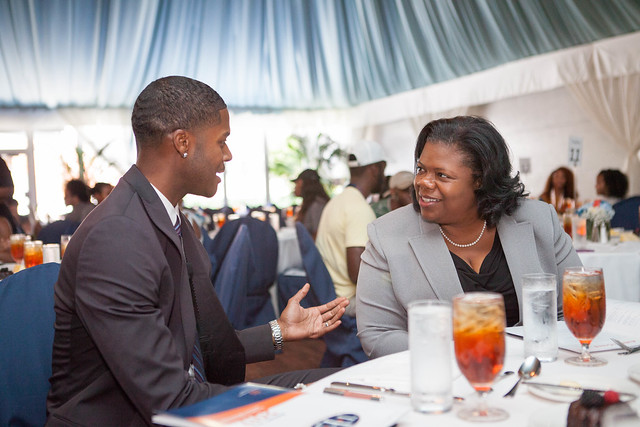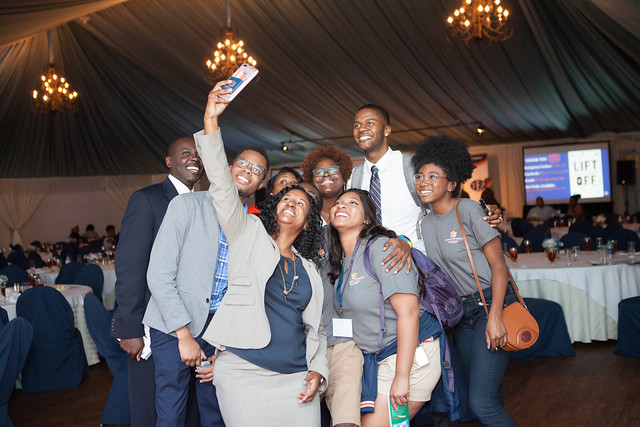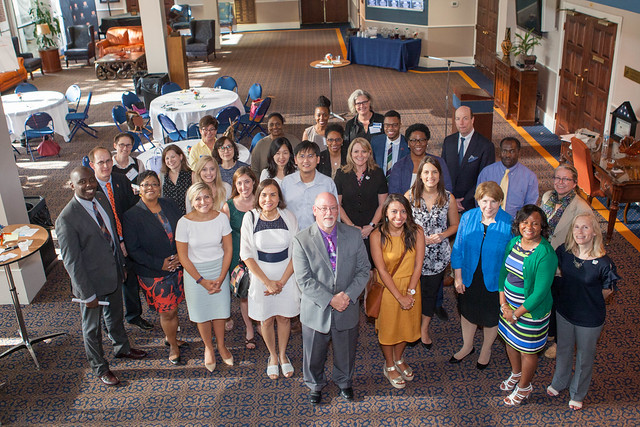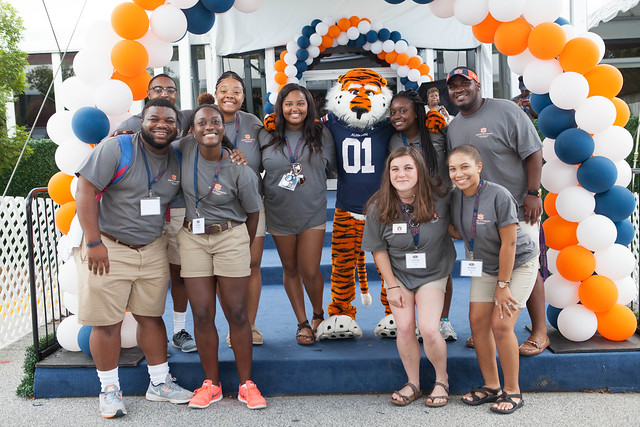Clayton provides experience, passion as Auburn’s first vice president devoted to inclusion and diversity
Article body
Taffye Benson Clayton has only been on the job at Auburn University since December, but she has quickly made her presence known.
As Auburn's first associate provost and vice president for inclusion and diversity, she is responsible for providing strategic vision, leadership, coordination and planning to further inclusion and diversity as core values throughout Auburn.
Clayton was instrumental in creating the Critical Conversations Speaker Series, which has tapped distinguished scholars, journalists and thought leaders to come to campus and share their diverse perspectives and ideologies throughout the school year. The first speakers—Ivy League Professors Cornel West and Robert P. George—drew a standing room only crowd to Auburn's Student Center ballroom.
The series may have been established as a result of Auburn's Climate Study on Inclusion, Equity and Diversity, but it also serves as a gateway to an open dialogue and the free exchange of ideas at a time when the alt-right movement is testing the First Amendment on college campuses across the country.
Clayton has and will continue to address issues of free speech on behalf of Auburn. Her latest comments appear in a recent New York Times article.
Who is Taffye Benson Clayton?
A native of North Carolina, Clayton attended the University of North Carolina at Chapel Hill, believing the undergraduate experience was about finding her way. She said she thought she wanted to major in political science, but after taking one speech communications class with a female African-American professor, she opted for that major instead.
That degree in speech communications and a master's degree in arts management led her to receive a doctorate in educational leadership and forge a path to a career in higher education. Clayton also credits her career trajectory to leveraging experiences in student affairs—as a resident assistant and a resident director—and a legislative research fellowship on Capitol Hill into her first professional job in higher education.
It wasn't long before her career focused exclusively on inclusion and diversity and she has never veered off that course.
It can be argued that such a career has nothing to do with speech or art—what Clayton earned college degrees in—but she said, "It has everything to do with communicating. It has everything to do with connecting with people. It has everything to do with relationship building. And I have found that the most valuable currency in any institution that I've worked has been relationships.
"So much of my work is about expressing ideas, talking about concepts, talking about leading in the inclusion and diversity space. My professors should be excited for me, right? My oral and written communication skills are clearly being utilized."
A passion for music and the arts—especially musical theater—that Clayton developed as a child still exists today. She can be called upon to sing the National Anthem with a moment's notice, but she'd rather be in the audience, enjoying a production at the Jay and Susie Gogue Performing Arts Center at Auburn University.
Clayton is not only an alumna of UNC, but she served it as vice provost and chief diversity officer and then associate vice chancellor and chief diversity officer before coming to Auburn. She supports her alma mater—a national powerhouse in men's basketball—but is eager to don orange and blue for SEC football inside Jordan-Hare Stadium this fall.
Getting to Auburn
Clayton said she considers her background "eclectic," but the variations led her to Auburn.
"Students often ask how I got to where I am, did I have it all figured out and I don't know that I did," she explained. "I just always played to my passion. And for me that initially was around policy, with the time I was on the Hill."
Clayton spent the research fellowship working for Sen. Ted Kennedy on the Committee on Labor and Human Resources. The policy work around equity and diversity led her to East Carolina University where she became involved in multicultural affairs.
"I didn't feel I had it all figured out, but I did know I would make a real contribution," she said. "I had every indication that my passion would lead me along the right path. And now it's led me to Auburn."
Clayton is Auburn's first associate provost and vice president for inclusion and diversity, but it doesn't worry her. She said her experience at other institutions, coupled with the support of Auburn's administration to seek strategic and collaborative moves in inclusion and diversity made the post alluring and exciting.
"I walked away from my visits to Auburn sensing both a commitment and a willingness to want to engage this work in an exciting way," said Clayton. "I got a very clear sense that Auburn wanted to be a national leader in this space. That was something I thought went well with my skill set and that's what led me here."
Clayton said she was impressed that Auburn established the new role at an associate provost and vice president level and connected its responsibilities to the academic core of the university. She also said she appreciated that Auburn had conducted a comprehensive Climate Study on Inclusion, Equity and Diversity, which resulted in a number of recommendations for the campus.
Since December, Clayton has met with different groups—deans, faculty, staff and students—across campus. This summer she focused on planning and hiring staff for the Office of Inclusion and Diversity, or OID. New hires so far include Ada K. Wilson, assistant vice president for access and inclusive excellence; Timothy Fair, special assistant for operations and strategic initiatives; Annette Kluck, assistant provost for women's initiatives; and Garry Morgan, special assistant for inclusion and diversity education.
Clayton's vision for Auburn doesn't include sweeping changes this fall, but rather strategically following the climate study recommendations, such as establishing a diversity action plan in each campus unit and connecting diversity liaisons around campus to the office. OID will be a hub, connecting all of campus under a shared mission.
"The vision is to engage people around the work collaboratively and move forward on the goals established by the institution," said Clayton. "There's nothing like being able to mark progress, knowing we have opportunities for improvement. I approach this work from a continuous improvement model point of view. There are always things we can do and do better."
Related Media
More Information
Getting to Know Taffye Benson Clayton
-
Born in Lumberton, North Carolina
-
Raised in Fayetteville, North Carolina
-
Mother was an educator, father was a Green Beret with the U.S. Army
-
Married to Reuben M. Clayton, former Congressional regional director, current entrepreneur
-
Son Monroe transferred to Auburn this fall and daughter Hailey is 13
Taffye is her given name. She said she believes her mother was reading a book, probably “Taffy of Torpedo Junction,” when she was born. Clayton said she’s grown into it and joked that she’s like other people known for one name—such as Oprah, Madonna and Prince.
If you were on a road trip, what music would you listen to?
“It would have to be a compilation CD of a variety of artists because I like just about everything. Because I grew up doing musical theater as a kid, I love show tunes, classical, pop, gospel, R&B, urban, country and western. I just love music. I think it’s an incredible force. I think it’s an incredible connector.”
Who has been the biggest influence on your life?
“It’s hard to say any one person. My parents have influenced me immensely, my brother as well. He’s a lieutenant colonel in the military, stationed now in Saudi Arabia. Some of my early teachers, certainly that college professor, Dr. Sonyini Madison, now at Northwestern University, and also Joanne Woodard, who taught me as an undergraduate student at Carolina and by the time I was promoted at East Carolina, she and I were peers because she had moved into a vice provost position at North Carolina State. Also Congresswoman [Eva] Clayton. I worked on her congressional campaign and later interned in her office on Capitol Hill. I have an aunt who was in the North Carolina legislature. My chancellors, particularly Dick Eakin and Steve Ballard at ECU, Holden Thorp at UNC, Provost Marilyn Sheerer at ECU and Vice Provost Henry Peel at ECU as well. They all have been really helpful in my career trajectory.”
If you could have a dinner party with three notable people, dead or alive, who would they be?
“Oprah would be one. I’d really like to talk with … This is hard! This is really, really hard. It would be nice to talk with John Kennedy. Because of the way he’s impacted so many different musicians, I’d probably want to talk to Quincy Jones. He has so much breadth and depth. Those would be the folks at my dinner party.”
Editor’s Note: Clayton added, “By the way, my dinner parties typically involve more than three people!”
Is there one thing people at Auburn would be surprised to know about you?
“I did musical theater: ‘The Me Nobody Knows,’ ‘Green Pastures,’ ‘The Pajama Game,’ ‘Jesus Christ Superstar,’ ‘A Raisin in the Sun’ and ‘The Fort Bragg Safety Show.’”
“This is a good story. I went to audition at the then Fayetteville Little Theater—it’s now the Fayetteville Regional Theater—for The Sound of Music. I sang my song, got a standing ovation and the executive director of the theater pulled me over to the side with my mom and said, ‘you’re awesome, but there’s a slight challenge. We aren’t going to be able to cast you in The Sound of Music, but in about eight months, we will begin auditions for A Raisin in the Sun and we’d love to have you.’ Later my brother auditioned as well and he ended up getting cast as Travis in Raisin. That was an interesting moment for me because honestly it never occurred to me that I couldn’t be cast as one of the [Von Trapp] kids. More than 40 years later, my brother went back to the theater for a reunion where they were doing highlights of the retiring executive director. He said, ‘I don’t think we realized when we were kids that that was the show that broke the color line at the theater.’ They had never done a show with an all-black cast. Sometimes you’re not as aware of those things when you’re a kid. In a small way, we were a part of making history.”
What book are you currently reading?
“Outliers: The Story of Success”
Media interested in this story can contact Communications Director Preston Sparks at (334) 844-9999 or preston.sparks@auburn.edu.
Auburn University is a nationally ranked land grant institution recognized for its commitment to world-class scholarship, interdisciplinary research with an elite, top-tier Carnegie R1 classification, life-changing outreach with Carnegie’s Community Engagement designation and an undergraduate education experience second to none. Auburn is home to more than 30,000 students, and its faculty and research partners collaborate to develop and deliver meaningful scholarship, science and technology-based advancements that meet pressing regional, national and global needs. Auburn’s commitment to active student engagement, professional success and public/private partnership drives a growing reputation for outreach and extension that delivers broad economic, health and societal impact.








